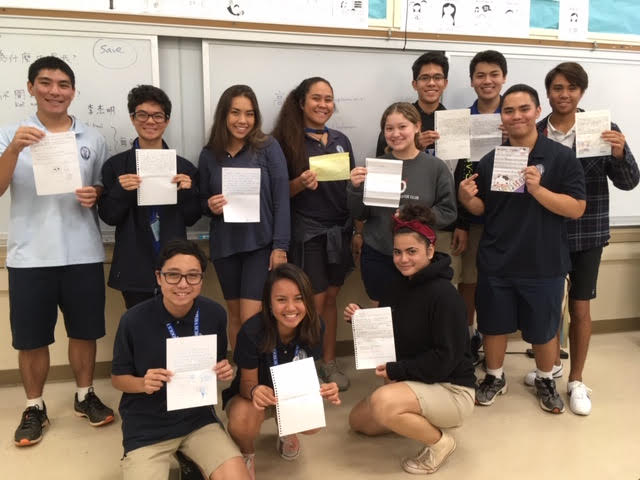KS Drops Mandarin Courses for 2020-21 School Year
The Mandarin Language Classes will not be available for students to enroll in for the 2020-2021 School Year
In the first week of winter break, students enrolled in Mandarin were stunned when they received a KS email containing the 2020-21 course catalog: the course catalog did not offer any Mandarin classes.
“I had assumed that the administration had made a mistake by not including the course as an option, but I was completely heartbroken when I learned that it was intentional,” Junior Cameron Enomoto, who is in her third year of Mandarin, said.
A week into winter break, Enomoto, along with approximately nineteen other Mandarin language students, learned that all Mandarin classes —1, 2, 3, and 4—were going to be terminated at the end of this school year. With numerous inquiries, students contacted administration for answers. To date, many remain dissatisfied.
The Mandarin students, who essentially discovered the language’s discontinuation through the course catalog, were later given the official news in class a week after winter break ended. Upon hearing the confirmation of this change, many of the Mandarin students wondered how this development would affect their future high school schedules and transcript.
“Being a global leader means being connected to other cultures, and language is a huge part of that relationship,” said Enomoto concerning the school’s decision. “It was part of my plan to take Mandarin 4 and count it as an AP course for my academic honors diploma, but I [had] to find another course to take in place of that to meet the requirement.”
The true panic to figure out the upcoming school year began to set in – this occurring all the while having no information about the entire situation. Every Mandarin student involved was not given any details, explanations, or information as to why the program was being discontinued. Thus, with a growing list of questions for the school, many of the students contacted the administrators for answers.
“[The administration’s] responses were not at all satisfying,” said Enomoto. “Some of the responses [given by the administration] was that due to lack of interest in the language, the school [felt] that it would be appropriate to provide support in other languages and student activities with more involvement.”
“As a student who is interested in the Mandarin program, it was almost insulting to learn that even though there were few of us, it was as though we didn’t matter to admin,” she said.
Enomoto and her family were not the only individuals to voice their thoughts. Another Mandarin student, who wished to remain anonymous, shared her experience during this circumstance.
“My dad contacted the schools after hearing the news in both an email and an in-person meeting with Piʻilani Akiona, the language department head,” said the student. “After my dad’s one on one meeting, he said the meeting was good but didn’t accomplish much. They had already predetermined the outcome so it didn’t feel genuine because their decisions were already set in stone.”
After receiving a considerable amount of feedback towards the school’s decision, several emails (sent between the administration and parents) took its course throughout January.
Dr. Taran Chun, head of Kamehameha Schools Kapālama, responded to an email sent by a concerned parent, disclosing a few details about the problem.
“The communication to our students, and by extension our parents and families, informing you that we were dissolving our Mandarin program was very poor and I apologize for that,” said Chun. “Mrs. Erskine (High School Principal) and her World Languages Department Chair will inform our students and their families of the pathway forward for ensuring that our students who want to continue on in Mandarin, have [the] opportunity [to learn the language].”
The response was soon spread to other Mandarin students, giving some insight to the events that occurred during and after winter break. However, such a response did not suffice the numerous inquiries students and parents still had in mind.
As anticipation for questions to be answered grew, another email – from Dept. Head Akiona – was sent to students to discuss “future Mandarin options.” Mandarin 2 or 3, the email stated, would be held as an online language course with Florida Virtual High School. Mandarin 4, on the other hand, would be taught as an independent study course on campus, with the possibility of students learning in-class in the same period.
Principal Erskine verified these solutions in a later email, sent to a concerned parent who had questions about these alternatives. Erskine addressed the issue by affirming that these solutions are the alternatives for the Mandarin program until further notice.
“I have already met with several parents to answer their questions as many of them were individual and specific to each student,” said Erskine. “My apologies if this resulted in a perception of lack of transparency.”
Regarding the Mandarin 4 alternative, Erskine said, “we are happy to allow students to take this course together. It will depend on the availability of the teacher and the other students’ schedules, so that is not something I can guarantee at this time.”
The solutions offered in the email didn’t lessen the need for more answers, many still trying to piece together why such an event happened in the first place. The unsatisfied reactions from the Mandarin students led to more meetings with the administration. In another email sent by the administration, students were offered to set up a time and place with Erskine to “discuss future Mandarin options.”
Pallas Beddow, a junior in his third year of Mandarin, spoke about his experience in his meeting. “The main takeaway [of the meeting] was that there is nothing that anyone can do,” Beddow said.
In Beddow’s meeting, he had asked for more reasons behind discontinuing the course. “The whole reason why this even became an issue was down to the budget and enrollment,” said Beddow. “It is fair to say that there are more people that are taking Hawaiian than Mandarin, but I think that the reason for that was the requirement of taking 2 years of Hawaiian, effectively eliminating the desire to take other languages.”
“There are so many barriers to cross that it is almost insane to think that one could cross them at all,” Beddow said. “One of the very first things Principal Erskine said in the meeting was that she believed I was attempting to change her mind and that it would not work.”
With all attempts seeming pointless, Beddow, like any other Mandarin student, at least wanted one thing: answers. “The topic of students not being informed properly did not come up in the meeting,” said Beddow, “as KS seems very opaque when it comes to open dialogue with their students about these sorts of issues.”
Again, in the meeting, Erskine confirmed that the solutions email were, indeed, the plans for Mandarin classes until further notice, but reiterated the fact that the Mandarin 4 independent study class “will depend on the availability of the teacher and the other students’ schedules.” The Mandarin 3 class, on the other hand, would continue to be an online course.
“The whole reason why school exists is to have these interactions with teachers that can further deepen our understanding on the topic,” Beddow said, commenting on the situation. “Not a machine that checks whether we learned each grammar structure good enough.”
Beddow wasn’t the only one with these thoughts.
Second-year Mandarin student Sophia Lee commented on the issue, as well. “I wondered, why not just let us continue the course with [our current teacher] until all of the current mandarin students graduated? Why do we have to take these classes online?” Lee said.
The question of why students were not informed properly or shown any transparency has only been answered to a minimal extent, as several Mandarin students have expressed. “Transparency was definitely an issue with this entire mess as I still don’t have all the answers,” Beddow said.
In the end, the only thing that Mandarin students can do is move forward, any efforts to combat these developments seeming – to them – hopeless.
“Being a part of something small but meaningful [like Mandarin] has taught me more about myself and Chinese heritage. After three years of dedicating time to mastering this language, it seems almost demeaning to have it taken away so suddenly,” Enomoto said. “Ultimately, I am shocked and disappointed with the decisions and actions of the administration. Should any events like this occur in the future, I hope they handle it more delicately.”
“I feel very fortunate [that I have had] the opportunity to share my love and passion for my language and culture to students,” I-ling Ogawa, the current Mandarin teacher, said. “My hope for my students is that whatever they learn from my classroom, it is something they can take beyond their high school [career], it is something they can apply to their lives later on – and that it is something that is a part of their high school memories.”

EMAIL: [email protected]
Aloha! My name is Gisele Bisch, and I'm from the North Shore. Now a senior this year, I am delighted to say that this is my second year of being a staff member in Ka Mō'ī! I have a profound interest in sustainability, nutrition, drawing and painting, and social justice. As a staff member of Ka Mō'ī, I am fortunate to be able to utilize my student-voice and participate in discussions regarding these and other issues.


